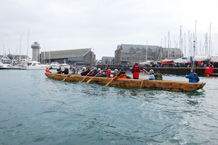
The launch of the boat in Falmouth
Buoyant bronze age boat makes history in Cornwall
Today history was made in Cornwall as a unique project to recreate a 4000 year old boat reached its dramatic conclusion as it launched into the waters of Falmouth Harbour.
Slipping majestically into the calm waters of Falmouth bay the 50ft long, 5 tonne vessel launched to a rapturous reception from the gathered crowd of onlookers.
A first for experimental archaeology and a first for the National Maritime Museum Cornwall, the 50ft long 5 tonne prehistoric boat has been reconstructed as part of a collaborative project with the University of Exeter. A team of volunteers, led by shipwright Brian Cumby, have spent the last year building this one of a kind craft out of two massive oak logs using replica methods and tools, such as bronze headed axes.
Andy Wyke, Boat Collection Manager at the Maritime Museum, says: “It has been incredible to see this whole project take shape in the Museum building over the past 11 months. Volunteers have poured everything into transforming three oak trees to what we have seen and achieved today. It’s been an incredible journey and one that will be remembered not only in our and Falmouth’s history. All the discoveries made have proven maritime history. Academic theory has come to life. We’re all so proud.”
This collaborative boat building project is led by Professor Robert Van de Noort from the University of Exeter. One of the world’s leading experts in Bronze Age period boats, he is heading up the Arts and Humanities Research Council funded project and hasn’t been shy in getting hands-on with the build and today paddled the boat with supporting volunteers.
Professor Van de Noort says of today’s events: “I’m so happy with the responsiveness of the boat. We always said you had to build the whole boat to understand what Bronze Age people experienced. When I was steering the boat and it got up to speed, I could turn her easily and it was more seaworthy than I expected. We have learnt so much through the whole process and today’s launch has revolutionised everything we knew.”
“There have been doubters, professionally, who questioned the feasibility of this vessel crossing the seas. This project has proven that it was possible.”
Dr Linda Hurcombe, Archaeologist at University of Exeter concludes: “You think a lot as an academic, you prepare, you do the writing you make a grant application and then you actually achieve a research project and this was the culmination of a very large scale project that has worked out brilliantly. To sit inside something that has not been seen in British waters for 4000 years and paddle it, and to see the carving of the wood, the tallow and the yew stitching all working together is a sight to behold.”
Date: 6 March 2013
